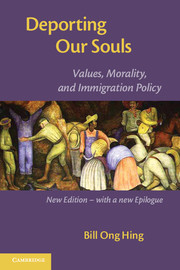Book contents
- Frontmatter
- Contents
- Foreword by Senator Edward M. Kennedy
- Acknowledgments
- DEPORTING OUR SOULS
- Introduction: Hysteria and Shame
- 1 Illegal Immigration: Give Them a Parade
- 2 Deporting Our Souls
- 3 Promoting Family Values and Immigration
- 4 Misusing Immigration Policies in the Name of Homeland Security
- 5 A Welcome Wagon for New Americans
- Epilogue: A Policy of Humanity
- Index
3 - Promoting Family Values and Immigration
Published online by Cambridge University Press: 18 August 2009
- Frontmatter
- Contents
- Foreword by Senator Edward M. Kennedy
- Acknowledgments
- DEPORTING OUR SOULS
- Introduction: Hysteria and Shame
- 1 Illegal Immigration: Give Them a Parade
- 2 Deporting Our Souls
- 3 Promoting Family Values and Immigration
- 4 Misusing Immigration Policies in the Name of Homeland Security
- 5 A Welcome Wagon for New Americans
- Epilogue: A Policy of Humanity
- Index
Summary
Promoting family reunification has been a major feature of immigration policy for decades. Prior to 1965, permitting spouses of U.S. citizens, relatives of lawful permanent residents, and even siblings of U.S. citizens to immigrate was an important aspect of the immigration selection system. And after the 1965 reforms, family reunification was the major cornerstone of the immigration admission system.
Although President Kennedy's reform goals initially envisioned a first-come, first-served egalitarian system, after his 1963 assassination the reform effort evolved into a category-oriented proposal that eventually was enacted. The 1965 immigration amendments allowed 20,000 immigrant visas for every country not in the western hemisphere. Of the 170,000 immigrant visas set aside for eastern hemisphere immigrants, about 80 percent were specified for “preference” relatives of citizens and lawful permanent residents, and an unlimited number was available to immediate relatives of U.S. citizens. The unlimited immediate relative category included spouses, parents of adult citizens, and minor, unmarried children of citizens. The family preference categories were established for adult, unmarried sons and daughters of citizens (first preference), spouses and unmarried children of lawful permanent resident aliens (second preference), married children of citizens (fourth preference), and siblings of citizens (fifth preference). Third and sixth preferences were established for employment-based immigration.
As Asian and Latin immigrants began to take advantage of the family-based immigration system in the 1970s and 1980s, somehow the emphasis on family reunification made less sense to some policymakers.
- Type
- Chapter
- Information
- Deporting our SoulsValues, Morality, and Immigration Policy, pp. 118 - 139Publisher: Cambridge University PressPrint publication year: 2006

